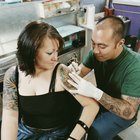
Jupiterimages/PHOTOS.com>>/Getty Images
Showing off a belly button ring can be interpreted in a number of ways, from the straightforward to the psychological. While body piercing and tattoos are ubiquitous in contemporary society, cultures throughout the ages have dabbled in body modification rituals, also known as bod-mod. In African and Native American cultures, body mutilation was used to welcome a member into a tribe or group, notes Psychology Today.com. The same theory might apply to sailors and prison inmates. Modern body piercing, however, is more about expressing individuality.
Following the Fashion
Sometimes a cigar is just a cigar. And sometimes belly rings are just belly rings. There are all types of belly rings available today in a variety of shapes, designs, colors and material. You might get a birthstone belly ring for the same reason you buy a birthstone ring for finger -- because you like the color and it represents good luck. If you've been working out, you might want a belly ring to show off your abs. Perhaps you want to emulate your favorite actress or model or simply like to follow the latest fad. Sometimes, fashion trends are literally skin deep.
Identity and Individuality
When Associate Professor of Psychology and Human Factors Christina Frederick-Recascino studied the motivations of college students with belly piercings and other bod-mod piercings and tattoos, most told her they were expressing their personal identity, not bowing to peer pressure. The students told her that their bod-mod reflects inner personality,interests, life goals, and life philosophy. A study at Pace University found that 35 percent of pierced women had belly rings -- and just 4 percent of young men.
Youth and Rebellion
Belly piercing and other forms of bod-mod are sometimes intended to shock. Multiple piercings, for example, might indicate a rejection of mainstream society, or at least of mainstream parents. Marquette University social scientist Steven Franzoi says that some youth use bod-mod "to distinguish themselves from their parents." He goes on to caution parents that too much criticism of bod-mod by parents "might reinforce the desire to do it."
When Rebelling Becomes Conforming
So many people have gotten belly piercings that it may have created a paradox. As Franzoi notes, if enough people do something, they may no longer be expressing their own identity, but engaging in an act of conformity within their own peer group. Franzoi points to the long-haired youngsters in the 1960s, who rebelled against older generations in a way that eventually seemed conformist. But going to bod-mod extremes may not be wise in the long run. Franzoi says that if you have piercings that are too noticeable or elaborate, you "might not be hired for certain jobs." That's a good argument for belly rings. You can show them off on your own time and cover them up for work.
Beyond Bod-Mod
Pamela Cantor, a psychologist at Harvard Medical School, says that belly rings and other piercings are just social events for many teens, no different than sleepovers and nail polishing for earlier generations of kids. But when bod-mod becomes self-mutilation, a line is crossed. Multiple painful piercings could qualify, but Cantor is most concerned about a step beyond ordinary piecing. "If it is cutting and not piercing, and if it is done in a solitary rather than a social manner, then it represents a totally different psychological picture." Cutting releases natural opiates that soothe a troubled soul, and a cutter begins to crave the experience. Getting a belly ring is obviously a different matter, and any of the reasons for doing so are relatively benign.
Related Articles

10 Reasons to Get a Nose Ring

When Did Men First Start Wearing ...

The Significance of Earrings on Men

About Christian Men Wearing Earrings

How to Tell Your Parents You Got a ...

When Did Pierced Ears Originate?

Reasons to Get a Nose Ring

Why Do People Wear Thumb Rings?

What Is the Meaning of Men Piercing ...

Why Does the Wedding Ring Go on the 4th ...

How Did Teenagers Dress in the '60s & ...

The Meaning of Exchanging Wedding Rings

Why Did Women Cut Their Hair to Become ...

What Happens to Tattoos as You Age?

Etiquette of Signet Rings

What Is the Meaning of Feather Tattoos?

Coptic Orthodox Dress Etiquette

Tips for Men's Earrings

What Are Knuckle Rings?

How Does Nu Skin Work?
References
Writer Bio
Jim Thomas has been a freelance writer since 1978. He wrote a book about professional golfers and has written magazine articles about sports, politics, legal issues, travel and business for national and Northwest publications. He received a Juris Doctor from Duke Law School and a Bachelor of Science in political science from Whitman College.
Photo Credits
Jupiterimages/PHOTOS.com>>/Getty Images